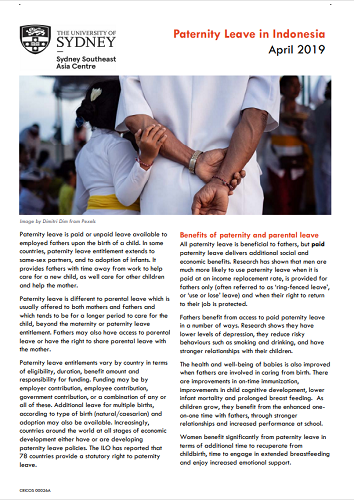Paternity Leave in Southeast Asia: the case of Indonesia, Myanmar, the Philippines, and Vietnam
Summary
This series of factsheets discusses the benefits of paternity leave and policy challenges in advancing paternity leave in Indonesia, Myanmar, Philippines, and Vietnam.
Research has shown that men are much more likely to use paternity leave when it is paid at an income replacement rate, is provided for fathers only (often referred to as ‘ring-fenced leave’, or ‘use or lose’ leave) and when their right to return to their job is protected. Fathers benefit from access to paid paternity leave in a number of ways including lower levels of depression, reduced risky behaviours such as smoking and drinking, and stronger relationships with their children.
Women benefit significantly from paternity leave in terms of additional time to recuperate from childbirth, time to engage in extended breastfeeding and enjoy increased emotional support. Paternity leave has also been found to reduce parenting stress, post-partum depression, maternal mortality, and intimate partner violence.
This series of factsheets is published by the Sydney Southeast Asia Centre at the University of Sydney, commissioned by Investing in Women.
Highlights
- In Indonesia, the 2003 Manpower Law entitles employed, married fathers to two days of paid paternity leave at full pay for the birth of a child, or for miscarriage, paid for by the employer.
- Mandated state sponsored paternity leave came into effect in 2016, following an amendment to the 2014 Social Insurance Law. The Vietnamese Law on Social Insurance provides employed, married fathers in Vietnam with a paid paternity leave entitlement of between 5 to 14 days.
- The Philippines Paternity Leave Act of 1996 (RA 8187) provides married fathers who are employed in the private and public sectors with seven working days of paid Paternity Leave at full pay for up to four children. (Note: under the Expanded Maternity Leave Law or RA 11210, mothers can allocate up to seven days of her paid maternity leave to the child’s father on top of the paid paternity leaves provided under RA 8187).
- The Burmese Social Security Law of 2012 entitles employed fathers who are covered under the law to 15 days of paid paternity leave. To be eligible, employed fathers are required to have made at least six months of social security contributions in the 12 months prior to the child’s birth.
- Although fathers across four countries are entitled to paid paternity leave, traditional gender roles, the statutory prerequisites, and working in the informal economy can pose challenges to access and its implementation.


